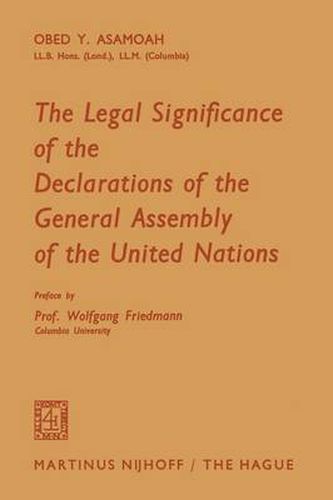Readings Newsletter
Become a Readings Member to make your shopping experience even easier.
Sign in or sign up for free!
You’re not far away from qualifying for FREE standard shipping within Australia
You’ve qualified for FREE standard shipping within Australia
The cart is loading…






This title is printed to order. This book may have been self-published. If so, we cannot guarantee the quality of the content. In the main most books will have gone through the editing process however some may not. We therefore suggest that you be aware of this before ordering this book. If in doubt check either the author or publisher’s details as we are unable to accept any returns unless they are faulty. Please contact us if you have any questions.
Mr. Asamoah’s book is concerned with an area of growing importance in the evolution of contemporary international law. The traditional division of the sources of International law into custom and treaties has already been supplemented in Article 38 of the Statute of the International Court of Justice by the general principles of law re cognized by civilized nations and-as subsidiary sources, the judicial decisions and the teachings of highly qualified publicists. But in order to cope with the diversity of international law in our time, we have to look to a far greater variety of sources of international law, and we shall have to recognize that, in accordance with the many-sided character of international law, these sources may vary greatly in intensity. In recent years, Declaratory Resolutions of the General Assembly have been much concerned with the general princi ples of international law. Sometimes these Declarations are interpre tations of the Charter and other instruments; sometimes they are evi dence of state practice and a developing customary international law ; sometimes they formulate new principles which, in some cases will eventually lead to international treaties or new custom, or in other cases will be accepted as authorative statements of international legal principles, in circumstances where a formal treaty cannot be attained. There are many reasons–often of an internal character-which prevent the conclusion of a treaty but not the acceptance of the principles contained in it.
$9.00 standard shipping within Australia
FREE standard shipping within Australia for orders over $100.00
Express & International shipping calculated at checkout
This title is printed to order. This book may have been self-published. If so, we cannot guarantee the quality of the content. In the main most books will have gone through the editing process however some may not. We therefore suggest that you be aware of this before ordering this book. If in doubt check either the author or publisher’s details as we are unable to accept any returns unless they are faulty. Please contact us if you have any questions.
Mr. Asamoah’s book is concerned with an area of growing importance in the evolution of contemporary international law. The traditional division of the sources of International law into custom and treaties has already been supplemented in Article 38 of the Statute of the International Court of Justice by the general principles of law re cognized by civilized nations and-as subsidiary sources, the judicial decisions and the teachings of highly qualified publicists. But in order to cope with the diversity of international law in our time, we have to look to a far greater variety of sources of international law, and we shall have to recognize that, in accordance with the many-sided character of international law, these sources may vary greatly in intensity. In recent years, Declaratory Resolutions of the General Assembly have been much concerned with the general princi ples of international law. Sometimes these Declarations are interpre tations of the Charter and other instruments; sometimes they are evi dence of state practice and a developing customary international law ; sometimes they formulate new principles which, in some cases will eventually lead to international treaties or new custom, or in other cases will be accepted as authorative statements of international legal principles, in circumstances where a formal treaty cannot be attained. There are many reasons–often of an internal character-which prevent the conclusion of a treaty but not the acceptance of the principles contained in it.